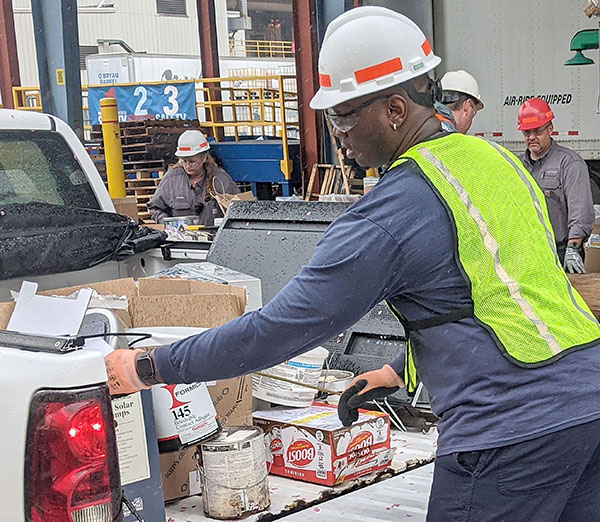In this new and uncertain time in our history, some businesses are looking for ways to support their communities and the front-line workers that are most vulnerable to this virus by manufacturing hand sanitizer. Most of these businesses are local distilleries, some are larger businesses that already use one or some of the ingredients for some other purpose, a few are businesses that have the equipment and facilities to supplement the manufacturing of hand sanitizer to make it more readily available to the general public.
The Food and Drug Administration (FDA), recognizing this, issued guidelines and a recipe for making alcohol based hand sanitizer that could be distributed to the general public. This formula included the specific requirement that the product start with 94.9% ethanol by volume or US Pharmacopeia (USP) grade Isopropyl Alcohol (IPA). Subsequently, Pipeline Hazardous Materials Safety Administration (PHMSA)/Department of Transportation (DOT) issued a temporary relief notice for the transportation, by highway only, for this hand sanitizer. The requirements are that the hand sanitizer meet the FDA’s preparation requirements, that this sanitizer have minimally 80% by volume alcohol (ethanol or isopropyl) by content, and that this relief only be in place as long as the FDA’s temporary policy is in effect.
The relief exemption to the existing Limited Quantity exemption, and some other DOT Hazardous Materials Regulations based on the volume of material being transported. The relief offers additional exemptions to the classification, packaging and hazard communication that would typically be required. And while these materials can be shipped either through a private or common carrier, they are only giving relief by highway; normal rail, water and air transportation regulations still are applicable. These offerors/shippers would not be required, during this relief, to register with PHMSA, but they would still be responsible for placarding offerings with an aggregate weight of over 1,001 pounds, and the transporters must adhere to standing safety requirements.
The relief is for combination packaging (inner packaging in an outer container/box) for inner containers of less than one (1) gallon and between one and eight (1 and 8) gallon(s). The primary packaging requirement for these shipments include ensuring that the containers are leak tight, securely closed and are packaged to prevent shifting and damage during transit – this may require cushioning to prevent breakage. It also requires that both the individual inner packages, as well as the outer container/box be appropriately marked with the words “sanitizer – contains ethanol” or “sanitizer – contains isopropyl alcohol”.
There are also additional training considerations for those offerors/shippers. These include ensuring that their employees have a general awareness/familiarization with the DOT HazMat Regulations (HMR), that they have function specific trainings such as the loading/unloading and storage requirements for hazardous materials, they have safety awareness around emergency response and security awareness both while the material is in transit as well as stored at the facility. This training should also include any company specific polices around hazardous materials (i.e., OSHA, RCRA).
While there are also relief provisions for larger containers of hand sanitizer being offered by the DOT (containers between 8 gallons and 119 gallons), most DOT HMR packaging, marking/labeling and shipping paper requirements still apply. Additionally, as there are businesses that may decide to continue to manufacture or package alcohol-based hand sanitizer past the relief notice period, it is important to remember that standard DOT Hazardous Materials Regulations will apply. That will require: the potential registration of the offeror/shipper with PHMSA; ensuring training requirements for all employees that have responsibilities with in the HMR to be trained, meeting packaging, marking/labeling, shipping paper, placarding; safety and potential security requirements. (https://www.phmsa.dot.gov/sites/phmsa.dot.gov/files/docs/Hazmat_Transportation_Training_Requirements.pdf)
It is imperative that should you consider using the FDA temporary policy for the preparation of alcohol-based hand sanitizer, or take advantage of the Limited Quantity temporary relief for the highway transportation of the alcohol-based hand sanitizer, that you understand the requirement of the policies. Heritage Environmental Services offers a free, on-demand webinar that walks thru the basics of these provision. Additionally, Heritage will be moving its in-person compliance trainings for both RCRA and DOT to webinar-based platforms for the remainder of the 2020 calendar. For more information, please go to https://www.heritage-enviro.com/services/training/#schedule.
More News From Heritage
-
6/27/24
Heritage Environmental Services to Acquire EBV from General Dynamics
Heritage Environmental Servicess, an EQT Infrastructure portfolio company, will acquire EBV from General Dynamics
-
6/13/24
Meet The Facilities – East Liverpool
An inside look at our incineration facility located in East Liverpool, OH
-
5/24/24
Habitat for Humanity 2024
Heritage hosted our 14th annual Habitat for Humanity build this month, partnering with over 50 employees from various THG companies.
-
5/6/24
Date set for the household hazardous waste collection in East Liverpool, Ohio
-
3/12/24
Equal Pay Day – Spotlighting Our Female Drivers
-
3/8/24
International Women’s Week Spotlight – Shannon Dippel
For International Women's Week, we're spotlighting some of the incredible women in the Heritage family. Our final spotlight is Shannon Dippel.
-
3/8/24
International Women’s Week Spotlight – Susan Adams
For International Women's Week, we're spotlighting some of the incredible women in the Heritage family. Our sixth spotlight is Susan Adams.
-
3/7/24
International Women’s Week Spotlight – Lea Wilson
For International Women's Week, we're spotlighting some of the incredible women in the Heritage family. Our fifth spotlight is Lea Wilson









